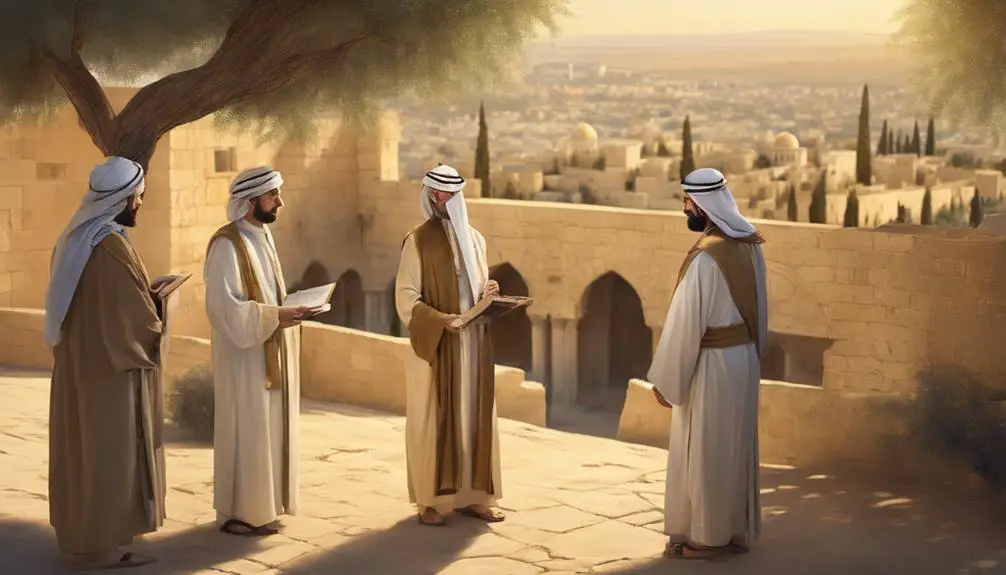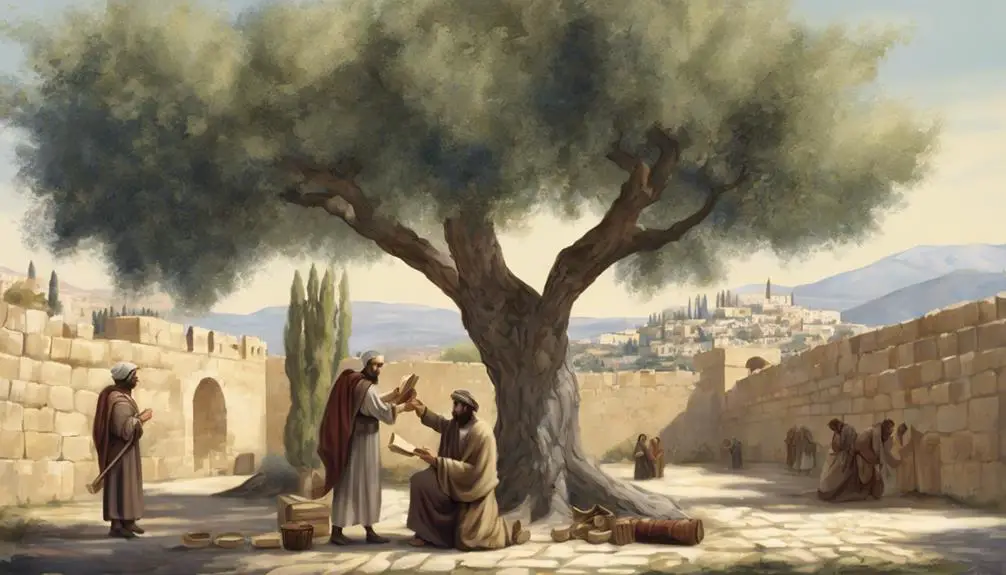Learn how ambassage in the Bible shaped divine narratives and human history, revealing a blend of diplomacy and prophecy in ancient texts.

Ambassage in the Bible
Have you ever considered how the threads of diplomacy and divine missions weave through the storied tapestry of the Bible?
You'll find that ambassage, or the role of messengers and emissaries, isn't just a footnote but a pivotal element in its narrative landscape.
From the prophetic dispatches tasked with divine messages to the clandestine operations of spies in wartime, these figures played crucial roles in shaping biblical history.
As you explore further, you'll uncover the nuanced ways in which these ambassadors carried out their duties, often blurring the lines between divine commands and human diplomacy, and perhaps you'll see the ancient texts in a new light.
Key Takeaways
- Biblical figures served as emissaries, embodying divine will through miracles and ethical leadership.
- Diplomatic strategies in the Bible facilitated trade, alliances, and cultural exchanges.
- Divine commands often directed the missions of human envoys, emphasizing faith and obedience.
- Undercover tactics and peace negotiations by biblical characters reveal early forms of espionage and diplomacy.
The Role of Prophetic Messengers

In the biblical context, prophetic messengers served as crucial intermediaries, conveying God's directives and warnings to the people. These figures weren't just messengers; they were the embodiment of God's will, chosen to lead and sometimes challenge the spiritual and ethical directions of their communities. You'll find that their roles were complex, often marked by miraculous signs and ethical challenges that tested their resolve and the faith of those around them.
Miraculous signs were a common thread in the narrative of prophetic messengers. These signs served multiple purposes: validation of the prophet's divine commission, a manifestation of God's power, and a tool for persuasion or warning. You see, these miraculous acts weren't just for show; they were deeply symbolic, reinforcing the message that the prophets were tasked to deliver. However, the reliance on miraculous signs also posed ethical challenges. The prophets had to navigate the fine line between demonstrating God's power and avoiding the trap of spectacle for its own sake. They'd to ensure that the signs led people back to faith, rather than becoming ends in themselves.
Moreover, the ethical challenges faced by prophetic messengers were profound. They often stood in opposition to prevailing norms, challenging kings and commoners alike to turn back to righteousness. This role required immense courage and integrity, as they faced persecution, misunderstanding, and often, isolation. Their mission wasn't just about delivering messages; it was about embodying and enacting the ethical standards that they preached, serving as living examples of devotion, justice, and compassion in a world that frequently resisted such ideals.
Diplomacy in Ancient Alliances

Throughout ancient history, diplomats played a pivotal role in forging and maintaining alliances, often acting as the linchpin for peace and cooperation between diverse polities. These envoys didn't just carry messages; they were instrumental in navigating the complex web of political, economic, and cultural interests that defined ancient relations. Their work often centered around securing trade routes and facilitating cultural exchanges, which were vital for the prosperity and expansion of their respective societies.
You'll find that trade routes weren't mere economic channels; they were lifelines that connected distant lands, allowing for the flow of goods, ideas, and innovations. Diplomats ensured these pathways remained open and protected, negotiating treaties that benefitted their homelands and their allies. They'd to possess a deep understanding of the political landscape, leveraging their knowledge to anticipate challenges and mitigate potential conflicts.
Cultural exchanges, too, were an essential aspect of their missions. By fostering mutual understanding and respect, diplomats bridged divides between different peoples, paving the way for more stable and enduring alliances. These exchanges weren't just about art and literature; they included technological and agricultural knowledge, religious beliefs, and social customs.
In essence, ancient diplomats were architects of the first global networks, laying the groundwork for a more interconnected world. Their efforts in securing trade routes and promoting cultural exchanges were fundamental to the development and sustainability of ancient alliances. Through their work, they not only preserved peace but also facilitated the growth and prosperity of their civilizations, leaving a lasting impact that echoes through history.
Divine Commands and Human Emissaries

Reflecting on the ancient world, one can't overlook the critical role that divine commands played in guiding the actions and missions of human emissaries. In the biblical context, these directives often came through angelic visits, marking a divine intervention in human affairs. Such instances served not only as a guide but also as a testament to the covenant between the divine and humanity. The narratives surrounding these missions are rich with symbolism and lessons, highlighting the importance of obedience, faith, and the role of covenant envoys in fulfilling divine will.
To delve deeper, consider the following points:
- Angelic Visits: These aren't merely supernatural encounters but pivotal moments where divine messages are delivered to humans. These visits often set the course for significant events or missions, underscoring the trust and responsibility placed on human agents.
- Covenant Envoys: Individuals chosen for these roles are tasked with missions that have far-reaching implications for their communities. Their actions often signify the maintenance or renewal of a covenant, emphasizing the symbiotic relationship between the divine and its followers.
- Moral and Ethical Guidance: Through these divine commands, emissaries are provided with moral and ethical frameworks. This guidance shapes not only their mission but also serves as a model for their community, illustrating the path of righteousness.
- Faith and Obedience: The narratives underscore the necessity of faith and obedience in the face of divine commands. These qualities are essential for the successful completion of their missions, reinforcing the idea that trust in the divine leads to fulfillment of one's purpose.
Analyzing these elements reveals the complexity and depth of divine-human interactions in biblical texts, highlighting the intricate relationship between heavenly commands and their earthly executors.
Peace Negotiations and Wartime Spies

The biblical narrative offers intriguing insights into the roles of peace negotiators and wartime spies, showcasing their pivotal contributions to the unfolding divine plan. You'll find that the use of undercover tactics and the ethical dilemmas surrounding espionage are recurrent themes. These individuals often operated in the shadows but played a crucial role in the outcomes of many biblical events. Their actions, though sometimes morally ambiguous, were instrumental in achieving higher purposes.
Let's delve into some key examples:
Character |
Role |
Impact |
|---|---|---|
Rahab |
Spy Helper |
Assisted Israelite spies, leading to the fall of Jericho |
Moses' Spies |
Intelligence Gatherers |
Scoped out Canaan to assess its viability for conquest |
Elisha |
Divine Spy |
Used prophetic insight to forewarn Israel of enemy plans |
Delilah |
Covert Operative |
Betrayed Samson, showcasing espionage's potential for personal gain |
In analyzing these figures, you're encouraged to consider the complexity of their missions. Undercover tactics were not merely about deceit; they often involved strategic communication, alliance building, and the discernment to know when to act and when to remain silent. Espionage ethics, on the other hand, invite you to question the morality of their actions within the context of their divine missions and the societal norms of their time.
These stories remind you that in the realm of divine missions, the line between right and wrong can sometimes blur, challenging you to think deeply about the ends justifying the means. It's a testament to the multifaceted roles that peace negotiators and wartime spies have played in biblical history and the complexity of their legacies.
Symbolic Acts of Biblical Ambassadors

Moving beyond the shadowy world of spies and negotiators, we now examine the symbolic acts of biblical ambassadors, whose missions often carried profound theological implications. These envoys weren't just messengers; they were embodiments of the messages they carried, with their actions rich in symbolism and meaning. Their ceremonial garments and the nature of their journeys weren't merely for show but served as pivotal components in the narratives of divine communication and covenantal relationships.
Here are four key symbolic acts of biblical ambassadors to consider:
- Ceremonial Garments: Often, ambassadors in the Bible wore specific attire that symbolized their authority and the significance of their mission. These garments signified not just their role but also the message they bore, embodying the solemnity and sanctity of their commission.
- Envoys' Journeys: The journeys of these ambassadors were themselves laden with symbolism. The terrain they traversed, the hardships they endured, and even the timing of their travels often mirrored the spiritual journey of the people they represented or the divine message they were tasked to deliver.
- Ritual Actions: Actions performed by these ambassadors, such as anointing, delivering decrees, or enacting parables in public spaces, served as powerful, living symbols of God's will, judgment, or blessing.
- Prophetic Declarations: Beyond mere verbal messages, the declarations of biblical ambassadors were often accompanied by symbolic acts that reinforced their prophetic utterances, making the message unmistakably clear and divinely authoritative.
Analyzing these symbolic acts reveals the depth and complexity of biblical narratives, where every detail serves a purpose, and every action carries weight beyond its immediate context.
Frequently Asked Questions
How Did the Concept of Ambassage in the Bible Influence the Development of Modern Diplomatic Practices?
You might wonder how ancient practices shaped today's diplomatic norms.
Well, early examples, similar to ambassage, laid the groundwork for modern diplomacy, focusing on peace treaties and international relations.
These practices encouraged the development of structured diplomatic communication and formal agreements between nations.
Essentially, they set the stage for the diplomatic protocols we follow today, ensuring that negotiations and the pursuit of peace remain central in international affairs.
Are There Any Instances in the Bible Where Ambassage Led to Unexpected or Unintended Outcomes?
In exploring historical negotiations, you'll find that peace missions sometimes lead to unforeseen consequences or diplomatic failures. Without delving into religious texts, it's clear that the complexities of human communication and intent often result in outcomes diverging from the original goals.
Such instances underscore the fragile nature of diplomacy, where even well-intentioned efforts can veer off course, highlighting the importance of strategy, understanding, and the unpredictable element of human behavior in diplomatic endeavors.
How Were Women Involved in Ambassage Roles in the Biblical Context, if at All?
Navigating the landscape of diplomatic missions, you'll find women's voices resonating through the corridors of power. In biblical times, their involvement wasn't just a whisper in the wind but a tangible presence in shaping destinies.
Analyzing these narratives, it's clear that women played pivotal, albeit often unsung, roles in ambassage. Their contributions, woven into the fabric of ancient diplomacy, highlight a complex interplay of influence and negotiation that transcends mere footnotes in history.
In What Ways Did the Geographical and Cultural Diversity of the Ancient Near East Affect the Methods and Effectiveness of Biblical Ambassage?
The geographical and cultural diversity of the ancient Near East significantly impacted methods of ambassage.
You'd find that trade routes facilitated interactions but also introduced complexities due to the vast distances and diverse terrains involved.
Language barriers further complicated communication, often requiring intermediaries or translators.
These factors influenced not only the effectiveness of diplomatic missions but also shaped the strategies employed to navigate these challenges, making adaptability a key aspect of successful ambassage.
Can the Principles of Ambassage Found in the Bible Be Applied to Contemporary Interfaith Dialogues?
Considering that 84% of the global population identifies with a religious group, the principles of effective communication are crucial for interfaith empathy. Interfaith dialogues can indeed benefit from ancient strategies of ambassage by fostering mutual respect and understanding.
Conclusion
In conclusion, biblical ambassadors served as the veins through which the lifeblood of divine messages and human diplomacy flowed, akin to rivers nurturing ancient civilizations.
Their roles, encompassing prophetic declarations, diplomatic engagements, espionage, and symbolic actions, highlight the intricate interplay between divine will and human agency.
This analysis not only contextualizes their missions within their historical and cultural milieu but also underscores their enduring relevance in understanding the dynamics of communication and representation in sacred texts.



Sign up